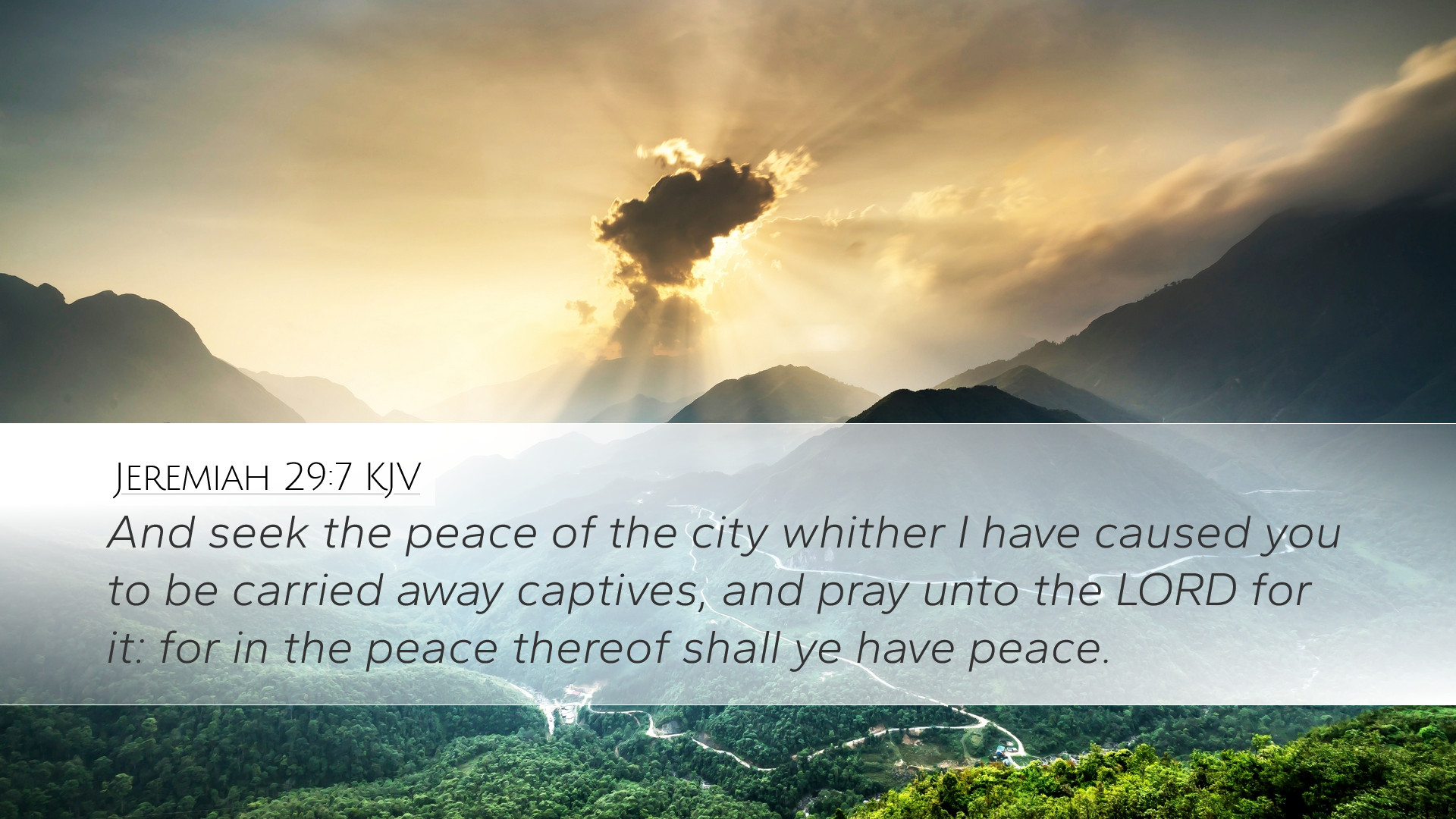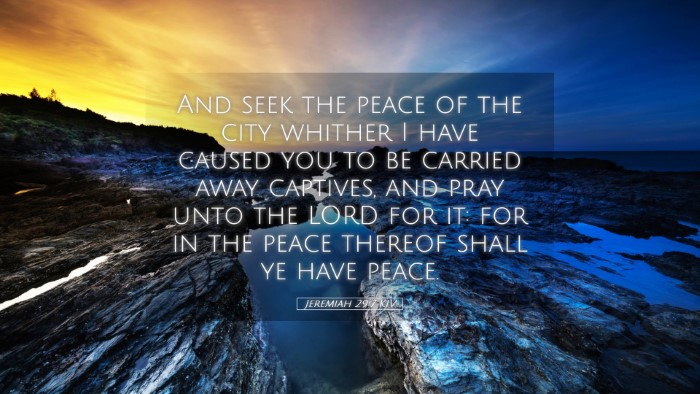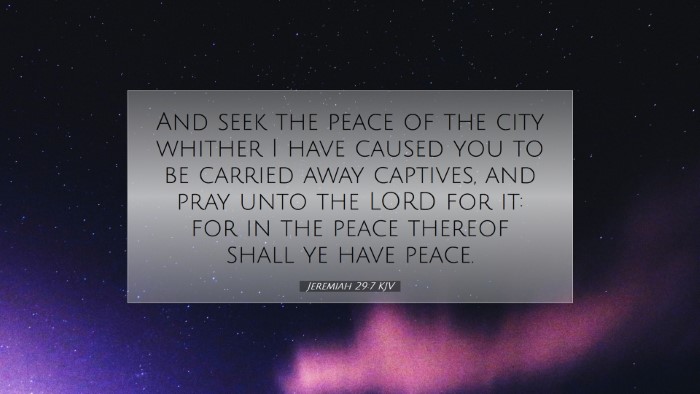Commentary on Jeremiah 29:7
Verse: Jeremiah 29:7 (ESV) - "But seek the welfare of the city where I have sent you into exile, and pray to the Lord on its behalf, for in its welfare you will find your welfare."
Introduction
This verse from Jeremiah encapsulates a profound theological insight into the responsibilities and attitudes of God’s people while living in a foreign land. It is a message addressed to the exiled Israelites in Babylon, conveying a significant directive from God through His prophet, Jeremiah. Understanding this verse requires examining the socio-political context, the nature of exile, and the practical implications of seeking the peace of a place that is not one’s own.
Historical Context
The context of Jeremiah 29:7 is critical in understanding its meaning. The Israelites had been forcibly taken from their homeland and brought to Babylon. This exile was a punishment for their disobedience against God, yet it marks a new phase of their relationship with Him and a challenge to uphold their identity. Jeremiah's message serves not only as a comfort but also as an instruction for living faithfully amidst adversities.
The Call to Seek the Welfare
God’s command through Jeremiah to seek the welfare of the city signifies a deeper theological principle about the nature of God’s covenant people. Below are reflections from notable commentators:
- Matthew Henry: Henry emphasizes that seeking the welfare of the city reflects a positive engagement with the world. He argues that exiles should not isolate themselves from the society in which they live. Instead, they should promote good wherever they are, demonstrating God’s concern for justice and peace.
- Albert Barnes: Barnes provides an interpretation noting that this welfare extends beyond mere physical safety or prosperity; it encompasses spiritual well-being, urging the exiles to influence Babylon positively while maintaining their distinct faith. This approach hints at the coexistence of believers in secular surroundings while staying true to their calling.
- Adam Clarke: Clarke interprets “welfare” as a holistic concept, including the social, economic, and spiritual dimensions. He proposes that the Israelites had a prophetic role to play in Babylon, acting as agents of God's peace and mercy, pointing towards a transformative witness amidst their trials.
Practical Implications of the Command
The directive to 'pray to the Lord on its behalf' presents a dual responsibility for the believers. In this section, we will explore how these implications are articulated by various theologians:
- Matthew Henry: He posits that prayer is an act of dependence on God, reinforcing the importance of seeking divine favor not just for themselves but also for the community around them. This also serves as an acknowledgment of God's sovereignty over all nations.
- Albert Barnes: Barnes illustrates this prayer as a form of intercession, aligning the hearts of the exiles with God's broader purpose. This underscores a proactive spiritual stance where believers engage in the life of their surroundings rather than adopting a defeatist attitude.
- Adam Clarke: Clarke remarks that prayer for the city implies a commitment to God’s mission and a willingness to embrace their context, highlighting that their welfare is intricately linked to the spiritual status of the society they inhabit.
The Interdependence of Community
Jeremiah 29:7 presents the principle of interdependence. The well-being of the city is directly tied to the well-being of its inhabitants. This can be unpacked as follows:
- Community Cohesion: The verse challenges readers to reflect on their role within the larger community, suggesting that the flourishing of society is ultimately beneficial to God’s people. Henry emphasizes that in an environment where believers seek public good, they reflect the character of God.
- Mutual Welfare: Barnes notes the practical outcomes when believers pray and work for their community's welfare. As they do this, they not only improve their environment but also find themselves restored and flourishing in ways they never anticipated.
- Spiritual Responsibility: Commentary from Clarke highlights the notion that responsibility extends to society. Christians are called to be light in the world, indicating that their active participation in societal issues exemplifies their faith in action.
Theological Themes
This verse touches upon several theological themes which are pivotal for understanding the broader narrative of Scripture:
- The Sovereignty of God: God’s sovereignty is an underlying truth that transcends geography. The mention of God sending His people into exile signifies divine control over their circumstances and affirms the belief that God has purpose even in distress.
- Hope and Restoration: Despite being in Babylon, there is a thread of hope present in God's instructions. His command implies that restoration will come through their engagement and faithfulness. Henry sees this as an encouragement to trust in God’s ultimate plan for His people.
- Biblical Justice: This emphasis on the welfare of the city aligns with God’s heart for justice and mercy. Believing communities are called to engage with societal structures, advocating for righteousness and justice, as highlighted by Clarke’s reflections.
Conclusion
Jeremiah 29:7 serves as a compelling reminder for believers in all contexts, equipping them with a perspective that values the interdependence of communities. As reflected by Henry, Barnes, and Clarke, the urgency of this biblical principle sustains a call to action: to engage compassionately and productively with the world, thereby revealing God's character through their actions and prayers. This verse invites believers to be agents of change, demonstrating that even in exile, they can find purpose and peace through devotion to God and a commitment to the common good of their surroundings.


